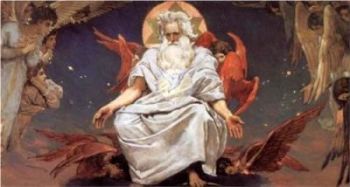
Even though I’ve read parts of the Bible many times, I love how bits of Sacred Scripture still can surprise me. For example, in today’s first reading, from Jonah, there’s a line I never noticed before, and it kind of rattles my whole vision of that story. It comes when Jonah is delivering his message to Nineveh. It says, “Jonah began his journey through the city, and had gone but a single day’s walk announcing, ‘Forty days more and Nineveh shall be destroyed,’ when the people of Nineveh believed God; they proclaimed a fast and all of them, great and small, put on sackcloth.”
Did you catch that?
Who’s talking to them and telling them to repent? Jonah.
Who did the people of Nineveh believe? “God.”
If I were writing this, my inclination would be to say, “when the people of Nineveh believed Jonah . . .” because that’s who’s speaking. But Sacred Scripture delves deeper than that, revealing — with one word — that the people of Nineveh recognized the message was from God, and acted accordingly.
During this Lenten season, how much do you well-and-truly recognize that the wisdom of the Church, the teachings of Sacred Scripture, the forgiveness of sins through the Sacrament of Confession . . . that all of those things are from God?
I mean, when Father Bob (or whoever) is in front of the congregation and sharing wisdom about how we need to ensure our lives are pointed toward charity and service, and that we’re doing what we can to set and keep our hearts and minds toward a path of holiness . . . that’s not just Father Bob’s suggestion. That’s not just a life tip, like how you might tell someone that sparkling water can remove a grape-juice stain. It’s the underlying message of God, of what Jesus was trying to get us to do.
Today’s Gospel selection, from Luke, makes this idea clearer: “This generation is an evil generation; it seeks a sign, but no sign will be given it, except the sign of Jonah. Just as Jonah became a sign to the Ninevites, so will the Son of Man be to this generation.”
Even more clearly than when Jonah spoke, the words of Jesus weren’t just one guy’s opinion on how we should live our lives; they were the words of God. And it’s up to the people (in this case, the whole world), to determine if they will believe God, as the people of Nineveh did when they heard Jonah’s message.
It’s common in today’s media to attack the messenger if we don’t like the message: “He’s a blowhard,” or “she’s too shrill,” or “he did that thing that one time that was bad.” And — indeed — “attacking the messenger” is literally how Jesus’ enemies and Pontius Pilate dealt with a message they didn’t like, a Good Friday many years ago.
But the message is as clear as its messenger (Jesus) is pure. And it falls to us to recognize that message, and act accordingly.
The people of Nineveh heard a message that basically said, “Heed these words, do better, or be destroyed.” And they recognized those words as coming from God.
We hear roughly the same words during Lent, with the same consequences: “Heed these words, do better, or risk eternal life.” In its own way, the stakes are greater than what Jonah imparted; eternity’s a mighty long time.
Today, I encourage you to think about the words of the Church, the insight of Sacred Scripture, and the message of Lent. Does your heart recognize the origin and gravity of that wisdom, and act accordingly?
Do you believe God?
